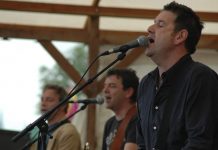The beauty of travelling resonates through its uncertainty. Pitfalls, encounters, cultures, innovations… Historically it has always been a challenge to exactly date the start of a trade, and then predict when it may disappear or even decide when to revive it as well as sharing a joyful tradition. As such, the third edition of the Onion Jack Tour will be a journey connecting the past traditions to the future of this profession.
In 1828, Henri Olivier, a poor man from Roscoff and orphaned at the age of 20, embarked on a journey that would soon play a part in Brittany’s History. He was struggling to survive from the land he inherited when a crazy idea came to his mind: why not sell onions in neighbouring England? British production at the time was not enough to meet consumer needs whereas the harvests of onions in the Roscoff region were in abundance. With three friends to help, he chartered a boat, filled it up with pink onions and they took to the sea. He started by selling directly to the people and it was then the Johnnies’ trade was born, expanding little by little to the whole Kingdom.
In 1928, a century on, 1,500 Breton men crossed the Channel for the selling season. The Roscoff onion is extremely appreciated in all English kitchens, even the most prestigious houses. It can make you cry at first but its soft caramelization when cooked makes it a highly rated ingredient.
Consequently, the trade has restructured with major companies taking over the market. The Johnnies, famous for onion strings hanging on their bikes, wearing the beret and stripy jumper, soon disappeared, engulfed by the global industrialisation of the 20th century. In 2028 how many Johnnies will there be? Let’s not predict too far away. In 2018, there are only 15 left, sole safe-keepers of a bicentennial tradition… quite a heavy burden they carry with pride.
The Onion Jack Tour
Laurent Caroff and Damien Zanlonghi are Johnnies of our century. At a time where the internet is the place to shop, they aim to take us on a journey back in time, by land and sea. With some retired Johnnies to lend a hand, they will make their way to England by sailing like old times, celebrating Henri Olivier’s path, his bravery, vision and open-mindedness.
The first edition took place from 14th to 31st October 2015, the second edition happened from 7th to 23rd October 2017. These previous editions traced Henri Olivier’s first steps and those of his successors. Laurent and Damien, with the Onion Jack Association and a group of passionate farmers, salt manufacturers, terroir and artisan producers, traders, musicians and artists, recreated scenes from 1828. Like the old days, they started with transport by cart and horse on the Roscoff roads, harvesting in fields and making the onion strings on site. Then, they took to the sea on two sailing boats loaded with Breton AOC produce, arriving on the south coast of England in Bridport West Bay to promote their trade and produce to their cousins and neighbours, the people of Great Britain.
A Breton market was set up with many delicacies: stalls selling pink onions, carrots grown in sand, traditional shallots, cheeses from the Monts d’Arrée, Saint-Pol-de Leon Artichokes, Noirmoutier organic salt, Roscoff seaweed, Breton beers and ciders and a selection of the best from Morlaix bay. An event that quite simply aimed to bring many great tastes of Brittany to Great Britain.
Friendly moments in music with Electric Bazar, Madame Oscar and Les Vedette, the theatre company Xav to Yilo and many others… Because a party without music is like a Johnny with no onion!…this simply can’t happen!
In addition, this adventure also reflects on an environmental aspect.
The Onion Jack Festival is happening in a global current context where energy is a point of focus (whether it is fossil or nuclear energy). On its end, Onion Jack would rather make a point and promote the most eco-friendly energies possible, in other words: human physical effort, passion and tradition. Onions will be harvested by hand and transported to the port of Roscoff, to then arrive in Great Britain where they will be unloaded and transported to West Bay by horses. Obviously, sailing boats will be dependent on wind power energy. Party-wise, the live shows and acoustic music will ensure a reduced carbon impact!
Because History is like a succession of waves and events, sometimes with winds in all directions, come to West Bay on 18, 19 and 20 October and celebrate reviving the spirit of the Johnnies. For when in 2028 we once again celebrate his journey and the thousands of encounters his story has made possible, we will all be able to say “at a time when many were selfishly looking after their own onions, we chose to celebrate the Roscoff pink onion: it’s past, present and future. Most importantly we were happy to be there”.










